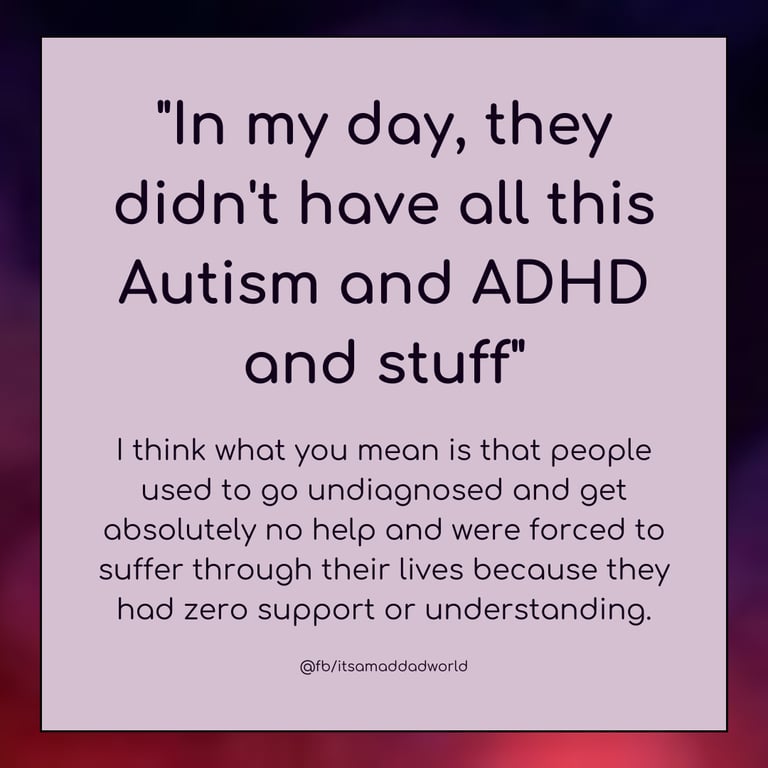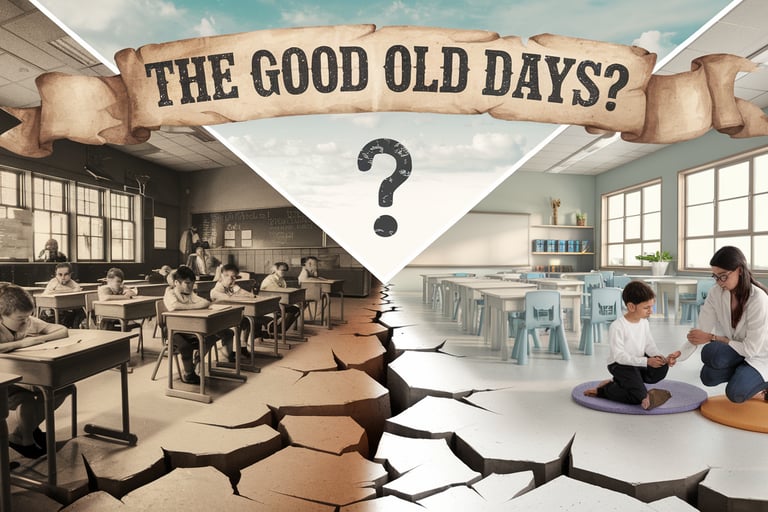The Good Old Days Weren’t That Great: Neurodivergence, Nostalgia, and Nonsense
3 min read
The "good old days" myth romanticises a time when neurodivergence was unrecognised, leading many to suffer without support. Instead of being simpler, those days lacked understanding, language, and resources, forcing individuals to mask their differences. While progress has made some accommodations and support available, inequality and oppression persist. Many still struggle to adapt within systems that ignore their needs. Increased awareness of conditions like Autism and ADHD is positive, but true progress requires broader recognition of diverse identities. We’ve made strides, but significant challenges remain - today is still not ideal for many.




The “good old days”. A time when life was apparently simpler, when people just “got on with it,” and when no one had the nerve (and it does take nerve) to pursue a diagnosis for things like Autism, ADHD, or other neurodivergences. Yes, according to some, those were the golden years - when everyone toughened up, threw on a smile, and at least acted “normal.” No labels. No fuss. But let’s pause for a second and unpack what’s really being haloed here.
What people often mean when they say, “In my day, they didn’t have all this Autism and ADHD and stuff,” is, in fact: “In my day, people didn’t know they had autism or ADHD - or most other things - so no one got any help. They suffered - misunderstood, unsupported, and forced to navigate a world that never even considered their needs.”
Back then, there wasn’t the language, the resources, or the frameworks we have now. Fewer diagnostic labels. Fewer therapists offering guidance. Fewer accommodations at school or work. There was just… struggle. People were left to spin through life without ever understanding why they couldn’t sit still, focus, or process the world like everyone else. Instead of thriving, they were forced to contort themselves into systems that neither cared for nor catered to them - systems that instantly deemed their differences as deficits rather than seeing them as valuable contributions.
The “good old days” were far from good for many. And the worst part? They’re not even fully behind us. Then and now, misdiagnosis, isolation, and erasure remain the reality for those who aren’t considered “normative.” Yes, progress has been made - some people now have access to accommodations, support, and even empathy. But equity? That’s still missing.
We may have the language and awareness now to understand neurodiversity, but for many, survival is still the only option. And survival is not just exhausting - it’s oppressive. People are expected to constantly adapt into whatever version of themselves is deemed “acceptable”. Evolution took millennia, but neurodivergent folks are expected to do it in the space of a morning commute. And if you happen to be black, female, disabled - or any combination of the above - those adaptations might not even be possible. The systems we all must operate within are often actively working against us. And for those without the tools to understand themselves or their needs, they’re left to “deal with it” without even knowing what they’re dealing with - or why.
The increased awareness, recognition, and research surrounding Autism, ADHD, and other neurodevelopmental differences today is something to celebrate. But let’s not pretend we’ve arrived. We still live in a world of inequality, injustice, and exploitation - where many are still being ignored or dealing with the legacy of that neglect. Yes, the growing acknowledgment that not everyone fits into the same mould is progress. But real progress would mean extending that recognition beyond neurodivergence - into every aspect of identity, and every system that dictates our lives.


